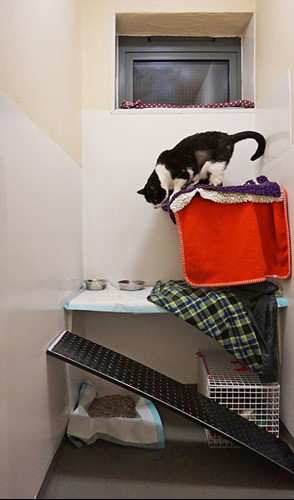Smudge is a 10 year old Domestic Shorthair who was diagnosed with hyperthyroidism following a routine vaccination visit. It was noted that he had lost a little weight and was tachycardic (had an increased resting heart rate).
Smudge’s referring vet started him on medication, and he came to the Feline Centre at Langford Vets for an assessment with our Feline Medicine Specialists to check his suitability for radioactive iodine treatment. During his visit we checked his urine and blood and he underwent x-rays, echocardiography (heart scan) and an abdominal ultrasound. We also checked his blood pressure and examined his eyes for signs associated with hypertension (high blood pressure).
Following these tests, we were happy to say that Smudge was suitable for treatment with radioactive iodine. He had some mild changes to his heart (cardiomyopathy) but we suspected these were secondary to the hyperthyroidism.
Several weeks later Smudge returned to the Feline Centre for his treatment with radioactive iodine. We admitted him a few days before his treatment date to allow him time to settle into the ward and hospital routine. After receiving his dose of radioactive iodine he stayed in our dedicated radioiodine ward; this has large walk in pens, shelves at different levels with ramps and webcams for us to keep an eye on the patients.
Smudge then stayed in our long stay cat ward (pictured here) for a further four weeks, whilst handling and waste restrictions applied; many cats do go home after 10 days, if owners’ are able to carry out the restrictions themselves, but this is not always possible for example if there are young children or pregnant ladies at home. Smudge became a favourite with our nurses and animal care assistants during his stay.
Immediately after treatment there was a significant reduction in Smudge’s thyroid hormone level and a successful response to treatment. Six months later Smudge is doing really well and his hormone level is within normal limits. The changes to his heart have also resolved with successful treatment of his thyroid disease.

Smudge is a 10 year old Domestic Shorthair who was diagnosed with hyperthyroidism following a routine vaccination visit. It was noted that he had lost a little weight and was tachycardic (had an increased resting heart rate).
Smudge’s referring vet started him on medication, and he came to the Feline Centre at Langford Vets for an assessment with our Feline Medicine Specialists to check his suitability for radioactive iodine treatment. During his visit we checked his urine and blood and he underwent x-rays, echocardiography (heart scan) and an abdominal ultrasound. We also checked his blood pressure and examined his eyes for signs associated with hypertension (high blood pressure).
Following these tests, we were happy to say that Smudge was suitable for treatment with radioactive iodine. He had some mild changes to his heart (cardiomyopathy) but we suspected these were secondary to the hyperthyroidism.
Several weeks later Smudge returned to the Feline Centre for his treatment with radioactive iodine. We admitted him a few days before his treatment date to allow him time to settle into the ward and hospital routine. After receiving his dose of radioactive iodine he stayed in our dedicated radioiodine ward; this has large walk in pens, shelves at different levels with ramps and webcams for us to keep an eye on the patients.
Smudge then stayed in our long stay cat ward (pictured here) for a further four weeks, whilst handling and waste restrictions applied; many cats do go home after 10 days, if owners’ are able to carry out the restrictions themselves, but this is not always possible for example if there are young children or pregnant ladies at home. Smudge became a favourite with our nurses and animal care assistants during his stay.
Immediately after treatment there was a significant reduction in Smudge’s thyroid hormone level and a successful response to treatment. Six months later Smudge is doing really well and his hormone level is within normal limits. The changes to his heart have also resolved with successful treatment of his thyroid disease.

